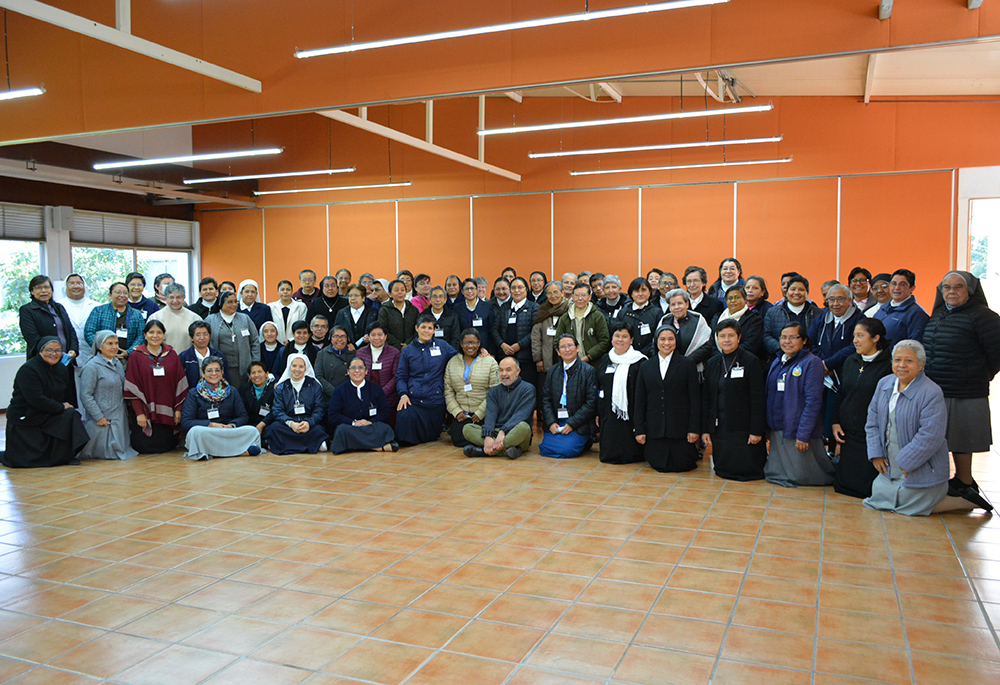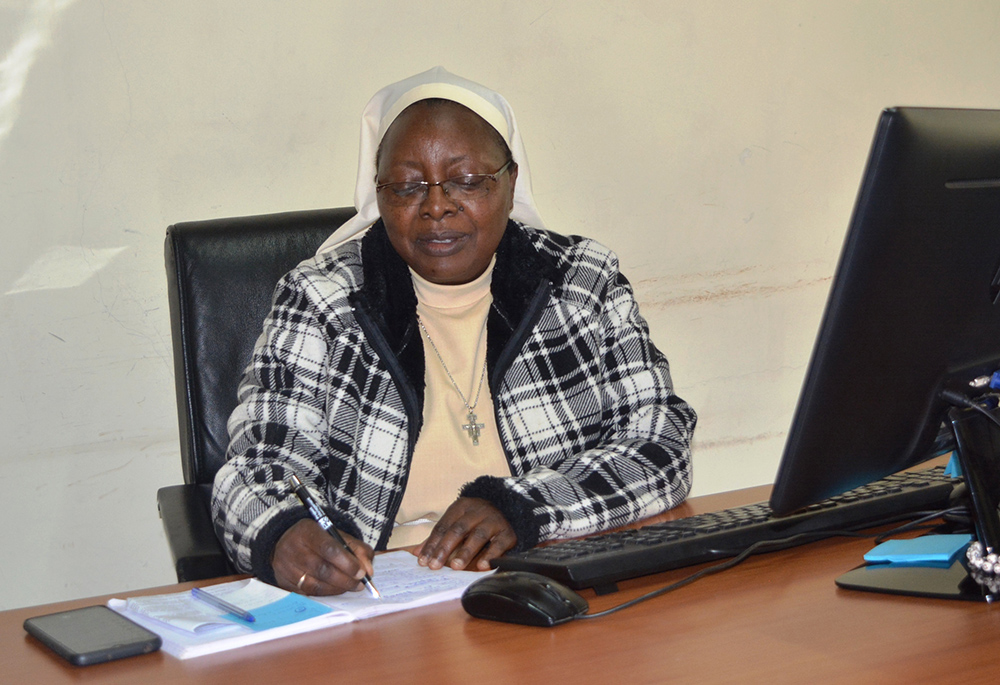As the conversation around ill and aging members of women’s religious communities continues worldwide, a monthly information exchange between Catholic sisters in Nairobi, Kenya, and Mexico City is making a tremendous difference.
Previous similar models focused on India via the Rome-based International Union of Superiors General, or UISG, and considered dementia care in the United States via the Leadership Conference of Women Religious, or LCWR, and UISG. Now this third initiative meets via a monthly Zoom session facilitated by the Washington, D.C.-based Center for Applied Research in the Apostolate, known as CARA. It focuses on health disparities, and closing the gap between larger international communities which have European or U.S. ties for resources and support, and Indigenous communities, which do not.
This focus on Indigenous identity among smaller congregations is what makes it special. Unlike a typical historical model where sisters from international congregations would travel in to live and work as foreigners, these sisters grew up in the communities they now study. The motherhouse is right there, not thousands of miles away. As trained partners studying their own home regions, they can be far more effective in assessing and meeting practical needs of senior sisters.
Participants gather and use data to inform future planning for elder care, and to act as the basis for teaching. These Zoom meetings welcome over 200 participants who learn about musculoskeletal issues, mobility, depression (a topic that can be quite difficult to discuss in traditional congregations), and more. They avoid the theoretical talk that had previously dominated, instead focusing on previously unmet day-to-day needs.
The Washington, D.C.-based CARA team consists of Sr. Thu T. Do, a Sister of the Lovers of the Holy Cross of Hanoi, and two sociologists, Jesuit Fr. Thomas Gaunt, and Jonathon L. Wiggins. The team in Mexico City consists of Sr. Brenda Hernandez, of the Daughters of Immaculate Mary of Guadalupe, who did her master’s degree studies at Boston College. She works with Fr. Luis Falcó, a psychotherapist with a doctorate in sociology from la Universidad Nacional Autónoma de México, and a priest of the Missionaries of the Holy Spirit, a religious institute.
Both Hernandez and Falcó cited their discovery of the ways that smaller communities with fewer resources were suffering so much more than those with over 100 members. Hernandez says that it is about learning through data where the vulnerabilities are.
The team conducted a nationwide survey that was answered by 162 communities. This yielded rich information on over 15,000 individuals, or fully half of Mexico’s 30,000 sisters. Here is just a sample of what they learned:
- Almost half of the sisters (47%) are over 65. Only 23% are under 45. This age imbalance can challenge vocational perseverance, or the chances that a younger woman will remain in a congregation for the long term.
- Although few congregations do have resources and well-defined integral health policies, most have none at all.
- Four out of 10 congregations lack adequate beds. Forty-six percent of the smaller congregations do not have rooms with special bathrooms.
- Up to 80% of the congregations lack access to professional advisory services. This puts all the work on a few untrained sisters, or even just one, instead of on trained caregiving teams.
- Only a little over one-third of the congregations (36%) made sure that sisters had regular checkups, and a similarly small number gave sisters access to mental health care.
- Although many health topics arise with older people, skeletal issues and mobility are the most urgent needs.
- More health insurance coverage is needed overall, but there is a specific gap between congregations and monasteries, with the latter only showing an 8% rate for insurance coverage.
- Not surprisingly, health expenses dominate congregational budgets, topping out at between 60 and 75%.

Hernandez and Falcó jointly lead the Office of Health and Development of Sisters in Mexico, and the Conrad N. Hilton Foundation — which also funds Global Sisters Report — provides support. Their office organizes services for integral health, and they are consistent with global trends by framing the aging process as both natural and potentially creative. While they aggregate data, they host three trainings for groups from 200-400 sisters to learn caregiving, what to do about impaired mobility, and how to manage the psychological aspects. They also offer subgrants, prioritizing those communities with the most need.
CARA, which is marking its 60th anniversary this year, guides these groups as they learn to gather and interpret their own data. Other fruit of the collaboration has manifested in events, such as a three-day conference at Notre Dame’s Cushwa Center for the Study of American Catholicism in 2022, and a more recent one in June in Nairobi, sponsored by the African Sisters Education Collaborative and CARA.
In Nairobi, one of the key participants is Sr. Bibiana Ngundo, a Little Sister of St. Francis, and the first visiting scholar at CARA in Washington, D.C., in 2017, which is how the connection was initially made for this three-nation collaboration. She is on the faculty of the department of religious studies at the Catholic University of Eastern Africa in Nairobi.
The second Kenya participant is Sr. Candida Mukundi, of the Assumption Sisters of Nairobi. She is director of the Centre for Research in Religious Life and Apostolate (CERRA-Africa), and on the faculty of education at the Catholic University of Eastern Africa.
After Mukundi returned to Kenya, her contacts at the Hilton Foundation encouraged her, the religious community, and her colleagues to base more of their health care decisions on facts. As they gather rich data, they also carefully listen to their older sisters in order to quantify what they say they want and need. This represents a switch from an older model where younger religious made all the decisions on the older sisters’ behalf, with no mechanism for consistent input.
The CERRA-Africa Data Center’s 2021 study on elderly and sick sisters in Kenya, Uganda, Zambia and Ghana was commissioned by Hilton and yielded similar but not identical results to the survey in Mexico. They used surveys, interviews, and focus groups to identify three key gaps:
- Three-quarters of congregations in Kenya, Uganda and Ghana felt financial constraints. That number rose to 91% in Zambia.
- In Kenya and Uganda, 41% and 45% respectively of congregations were missing infrastructure to support elderly and sick sisters, while 60% of respondents in Zambia needed more infrastructure.
- Around half of the congregations in Uganda and Zambia noted that they were low on personnel, whereas one-third of congregations in Ghana and one-quarter in Kenya were missing personnel.
Based on this, they were able to recommend increased donor support to address the cost of medical bills, medicines, new construction and renovations, diet, and training. They also recommended that advisory committees be set up for each sister conference.
On the personal side, Mukundi and Ngundo learned that older sisters have a passion to share about their pasts, their experiences in ministry, and also their struggles. One older sister had been the head of a school, but after straining her back severely she found herself almost overnight placed in a care home. The abrupt move was quite disorienting.

” ‘Everyone changes their voice,’ ” said Mukundi, repeating what the older sister had shared in their conversation. “The older sister said, ‘They speak to me like I’m a child now. Yesterday we were speaking normally.’ ”
“They felt like we were treating them differently,” Mukundi continued, “when in actual fact they are still their same selves. We have to change the way we are relating with this person.”
After the community made important changes to address the sister’s disorientation and reported feelings of being spoken to that way, there was great improvement overall.
“Now even when they are bedridden, they [feel] part and parcel of the congregation,” said Mukundi. “They feel they embody the mission. They pray for the sisters who are out in the mission, but they also feel they participate. … Those of us who are in active ministry need to connect more [with them].”
It is through these deeply personal conversations with frustrated and vulnerable older sisters that indigeneity can further be seen as a huge asset. Because the younger sisters are from the same community, they can conduct focus groups with quicker, easier rapport than when they go out to external communities.
“It helps a lot,” said Mukundi. “You don’t have to take so much time being at peace, or [getting] comfortable, to share from your heart.”
Mukundi and Ngundo then share what they learn with the other African countries in the monthly meeting. They also train sisters as data collectors, being careful to match these sisters to their own congregations or ones close to their charism.
Back in Mexico, Hernandez noted how this webinar-based, inter-community method addresses a great cultural challenge. In the past, talking about health care, specifically illness, was not generally accepted, either in these religious communities or in Mexico at large.
“It was not even a topic on the table,” she said. “Now it is on the table in every community, thanks to our meetings and webinars.”




